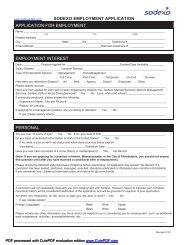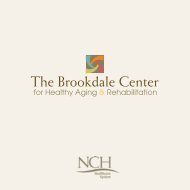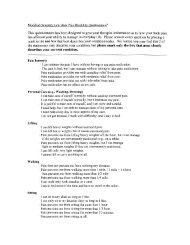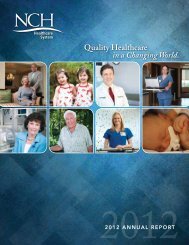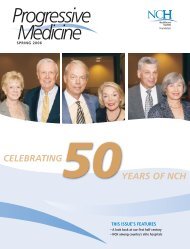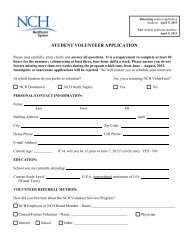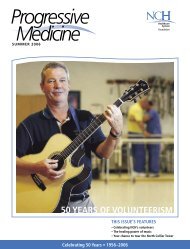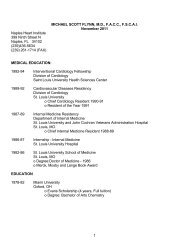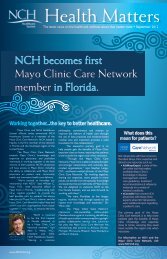Read Our Geriatric Tip Sheet - NCH Healthcare System
Read Our Geriatric Tip Sheet - NCH Healthcare System
Read Our Geriatric Tip Sheet - NCH Healthcare System
Create successful ePaper yourself
Turn your PDF publications into a flip-book with our unique Google optimized e-Paper software.
TIP SHEET: Finding a <strong>Geriatric</strong> Medicine Primary Care Doctor<br />
Q: Are you around 55-years-old or older and in need of a new primary care<br />
doctor<br />
A: A <strong>Geriatric</strong> Medicine physician has received additional training in the treatment<br />
and care of older adults, usually 55 or over. It's important to find one you can<br />
trust, with whom you can communicate well and establish a relationship.<br />
Q: What is a <strong>Geriatric</strong> Medicine primary care doctor<br />
A: A <strong>Geriatric</strong> Medicine primary care physician is an internal medicine or family<br />
practice physician who has additional training in caring for older adults (verses a<br />
pediatrician whom has additional training in caring for babies and children.)<br />
As we advance through life and reach the ages of 55 and beyond, often we<br />
develop health issues that are directly related to the aging effects on the body.<br />
Sometimes a number of different medications may be needed to treat varying<br />
conditions. The geriatric medicine physician carefully monitors the effects of<br />
drugs and the different combinations, trying to minimize potential drug<br />
interactions. They work to not only treat the conditions and symptoms, but to<br />
prevent their reoccurrence and prevent new illnesses.<br />
The geriatric medicine primary care physician will work with you to coordinate all<br />
of your health care and determine if you require care from an additional<br />
specialist, such as a cardiologist, orthopedist, urologist, neurologist,<br />
rheumatologist, dermatologist, etc.<br />
If you are lucky enough to be extremely healthy and do not have any health<br />
issues and do not need any medications, you may not need a geriatric medicine<br />
doctor.<br />
Q: What training do <strong>Geriatric</strong> Medicine doctors receive<br />
A: In addition to the training as an Internal Medicine physician or Family Practice<br />
physician, our <strong>Healthcare</strong> Group <strong>Geriatric</strong> Medicine physicians have<br />
• completed an additional full one-year fellowship training program specific<br />
to geriatric medicine patients.
• received training to manage complex ailments and multiple medical<br />
needs.<br />
• received additional training in helping their patients prevent future health<br />
problems and live healthier, age slower, and promote a higher quality of<br />
living.<br />
Q: How do Nurse Practitioners work with the <strong>Geriatric</strong> Medicine<br />
physicians<br />
A: Nurse Practitioners (NPs) or Advanced Registered Nurses (ARNPs) are<br />
licensed and complete bachelor degree nursing programs. Then they work to<br />
gain experience and complete graduate-level training to gain a masters degree<br />
and, in some cases, a PhD. Each NP must pass a rigorous national exam before<br />
being licensed in the State of Florida.<br />
The NP (or ARNP) is very well trained to care for the patient in a variety of ways:<br />
• Sick and well visits<br />
• Make diagnoses<br />
• Perform physical exams and routine tests<br />
• Administer immunizations and injections<br />
• Administer medications<br />
• Educate patients<br />
A physician supervises each patient's progress. Most patients find that working<br />
with a NP, in concert with their primary care physician, offers them optimum care.<br />
Q: What are some tips for finding the right <strong>Geriatric</strong> Medicine physician<br />
A: First, determine what is important to you. Make a list of things that matter the<br />
most when choosing a doctor. For example:<br />
• Is it important to you to have a doctor with the extra training in treating<br />
older adults<br />
• Do you have a number of health issues<br />
• Is preventive care important to you<br />
• Is location important to you<br />
• Do you need to choose a doctor based on your insurance requirements<br />
• Do you prefer a male or female physician<br />
• Do you require a doctor who speaks a certain language<br />
• Do you consider a doctor’s age important when making your decision<br />
• Do you prefer an MD or a DO<br />
• Is it important the doctor be board certified<br />
Check with your health insurance company to determine which providers are<br />
considered covered or in-network by your specific plan.



